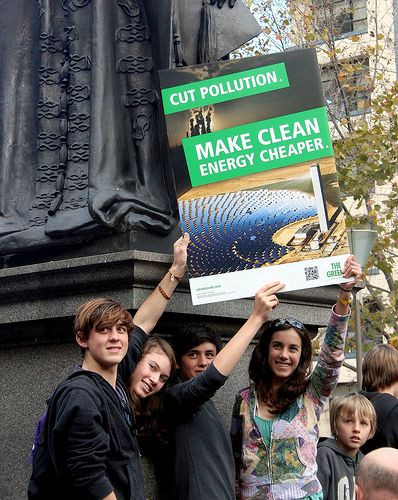Did The Recession Make Your Teenager A Better, More Socially Conscious Person?

These days, teenagers are usually regarded as being Justin Bieber-loving, Instagram/Facebook-obsessed, self-centered little jerks. But new research from the same people who coined the phrase "Generation Me" paints a brighter picture for U.S. teens who lived through the Great Recession. The study suggests that these teens became more concerned about others and the environment during this troubling time.
The findings are based on a national survey given each year to 50,000 students in the 8th, 10th, and 12th grades. One of the longest running studies on adolescents, this survey — called "Monitoring the Future" — has been distributed to teens since 1975.
The researchers looked at the opinions and self-reported behaviors of 12 graders from three different time periods: pre-Great Recession (2004-2006), during the recession (2008-2010), and the end of the "ME decade" (1976-1978). The 1970s are generally regarded as the "ME decade," given many people stepped away from the hippie-laced communitarianism of the 1960s and embraced individualism that would later define the capitalist nature of the 1980s.
"Hey Mom, Is this One Direction poster recyclable?"
The responses that the psychologists focused on fell into four major categories:
1. Concern for others. Would you eat differently to help starving people? Do you want your future job to be altruistic?
2. Envirionmentalism. Do you conserve energy/electricity around the house? Do you bike or use mass transit?
3. Materialism. How important to you is it to own expensive clothes or have a job that makes a lot of money?
4. Positive self-views. Do you think that you're smarter than your peers?
A majority of recession 12th graders — 63 percent — said that they try to save electricity by turning down the heat at home, while only 55 percent report the same right before the recession. More kids reported using bicycles and mass transit during the recession, and they were more likely to reflect on social problems, like the public and governmental actions toward the environment.
However, overall social conciousness was down relative to the late 1970s.
"Although young people's concern for others and for the environment is still lower than it was in the 1970s, the recession has apparently led youth to focus more on others compared to the economic boom times of the mid-2000s." said Dr. Jean Twenge, professor of psychology at San Diego State University and the author of "Generation Me."
This change in perspective could be due to a variety of reasons. The unification between social media and the 24-hour news cycle may have made it easier for teens to follow social and political issues, like elections or the recession itself.
Mainstream concern over the environment and global warming has certainly increased over the past few years, in light of some major disasters like the Fukushima nuclear plant meltdown and superstorms like Hurricane Sandy.
"Amidst all of the suffering caused by the recession, there may be positive benefits to society if more Americans are looking outside themselves," continued Twenge
"This is the silver lining of the Great Recession," continued co-author Dr. Patricia Greenfield, a UCLA distinguished professor of psychology. "These findings are consistent with my theory that fewer economic resources lead to more concern for others and the community. It is a change very much needed by our society."
But while some perceptions changed, others remained firmly in place. Recession-era high schoolers thought higher of themselves and were more likely to think that they were smarter than peers.
"In the past, recessions led to less positive self-views; the recent recession is the only one that produced an increase," Twenge said
In other words, their inflated senses of self are doing just fine.
Source: Park H, Twenge JM, Greenfield PM. The Great Recession: Implications for Adolescent Values and Behavior. Social Psychological and Personality Science. 2013.



























